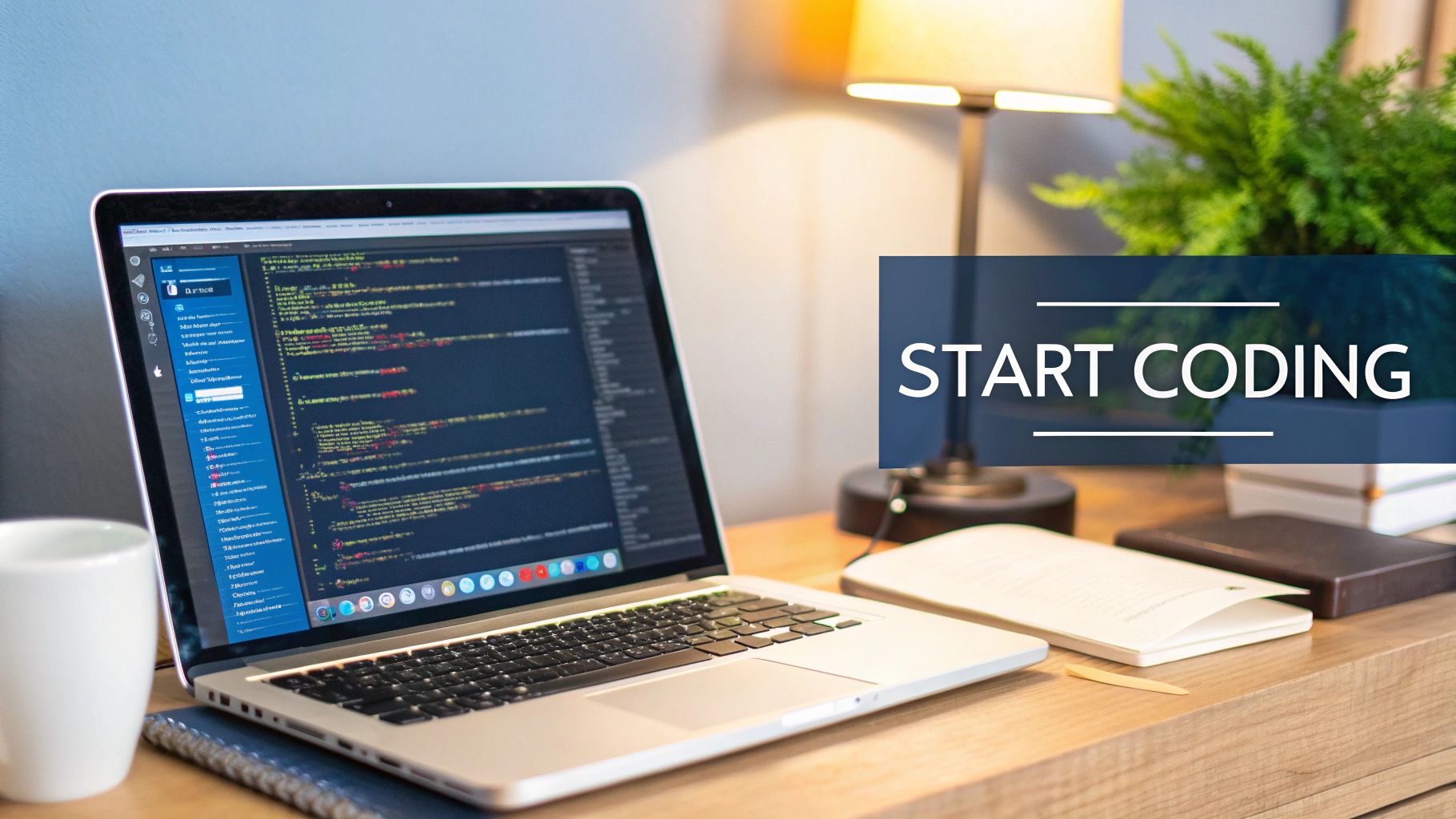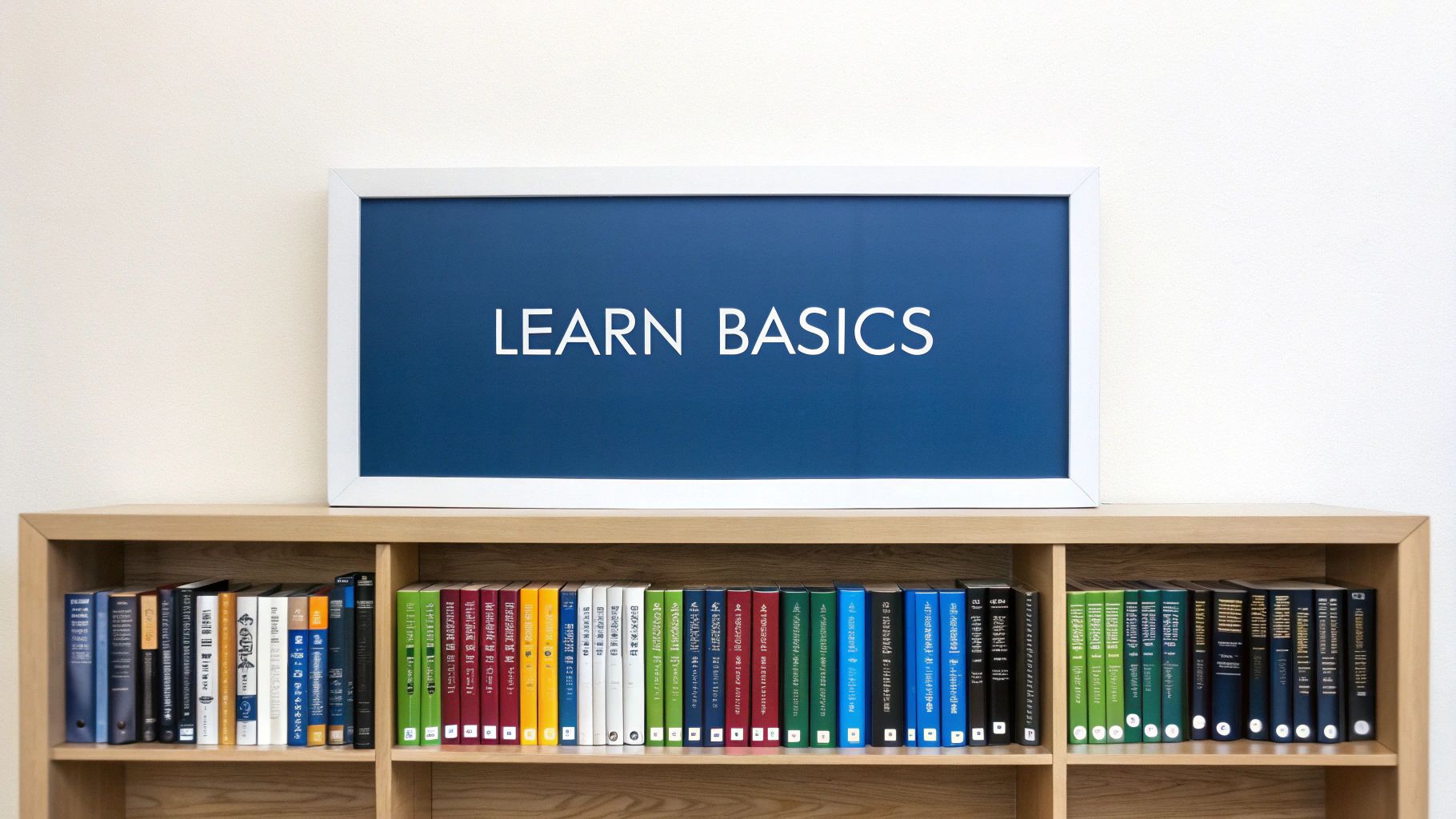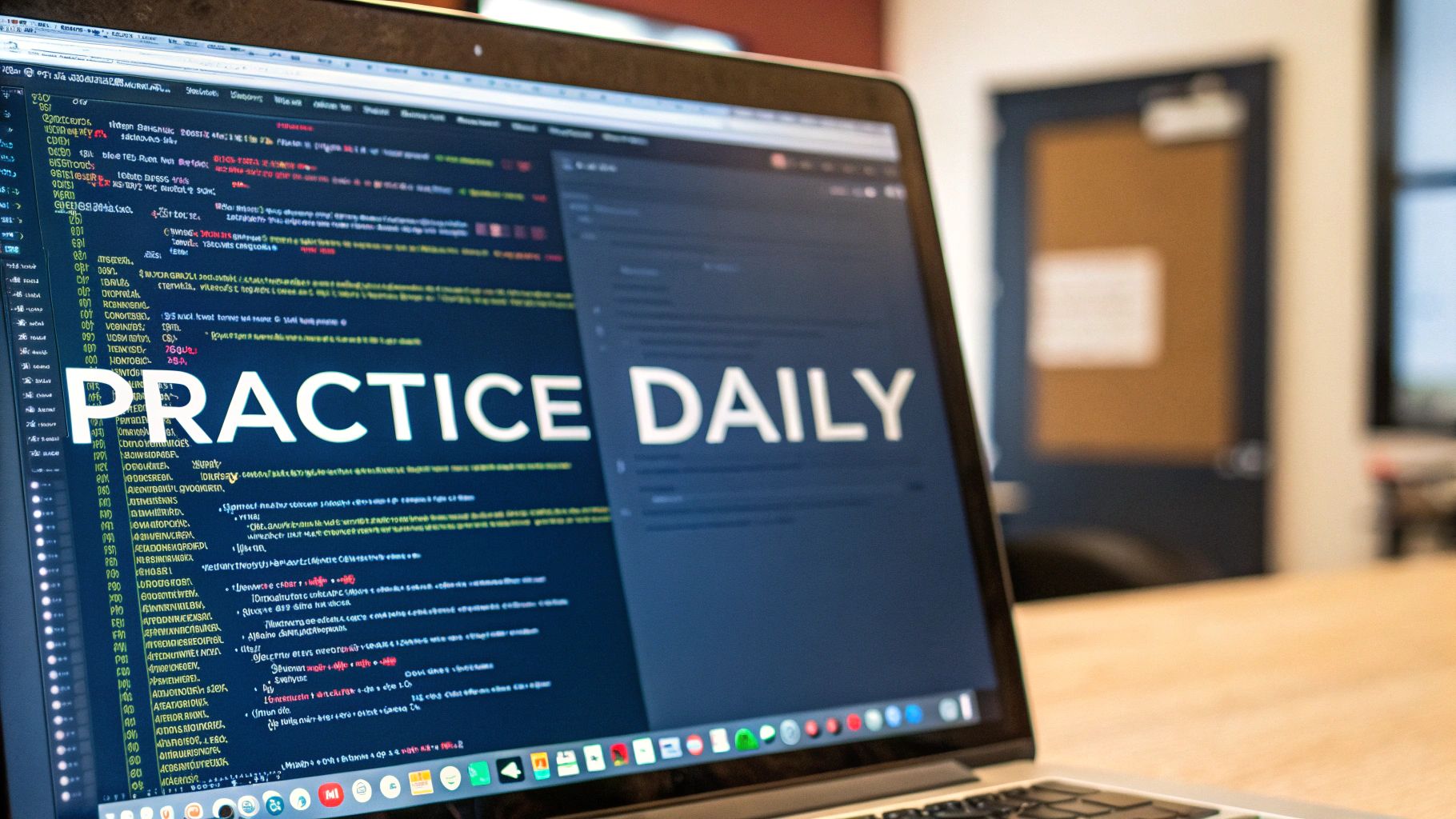How to Learn Coding for Beginners: A Step-by-Step Guide to Programming Success
Breaking Down the Coding Journey for True Beginners

Starting to code can feel overwhelming at first. That exciting end goal – whether it's launching a career in tech or building your own project – often seems far away. But like any big goal, learning to code becomes much more manageable when you break it into smaller steps. Let's look at how to approach learning to code in a way that sets you up for success.
Shifting Your Mindset: From Memorization to Problem-Solving
Many beginners think coding is all about memorizing commands and syntax. While knowing syntax matters, it's just one piece of the puzzle. The real skill is problem-solving – being able to break down complex challenges into smaller, solvable parts. Think of coding like building with LEGO blocks – you don't need to memorize every possible combination. Instead, focus on understanding how pieces fit together to create what you want. This mindset shift makes learning to code feel more natural and less like cramming for an exam.
Embracing the Power of Small Wins
When you're just starting out, the amount of coding information available can be mind-boggling. It's easy to fall into "tutorial hell" – endlessly watching videos without actually writing code. The fix? Start small. Build simple projects that you can complete. Even basic programs help cement your understanding and boost your confidence. For example, begin with a basic webpage using HTML and CSS before tackling more complex web applications. Each small success builds momentum for bigger challenges ahead.
Finding the Right Learning Approach
Everyone learns differently when it comes to coding. Some people thrive in structured online courses, while others prefer exploring on their own with free resources and community support. Try different methods to see what clicks for you. Many successful learners mix approaches – for instance, taking a course for core concepts, then joining coding challenges to practice those skills in real projects.
Managing the Emotional Rollercoaster
Learning to code has its ups and downs. You'll likely face moments of frustration and self-doubt – that's completely normal. The key is to keep going even when things get tough. Connect with other learners through coding forums and community groups. Share your struggles and celebrate your wins. Having support from others who understand the journey makes a huge difference in staying motivated.
Building a Solid Foundation
Just like you can't build a house without strong footings, you need solid programming basics before tackling advanced concepts. Focus first on core ideas like variables, data types, control structures, and functions. These fundamental building blocks work across all programming languages. Taking time to really understand these basics will make learning more complex concepts much easier later on. Start with the fundamentals, practice regularly, and build up your skills step by step.
Choosing Your First Programming Language (Without the Confusion)
Once you understand the basics of how code works, picking your first programming language is the next big step. While this choice can feel daunting, focusing on your goals and interests makes the decision much simpler. Let's look at how to choose the right language to start your coding journey.
Why Your First Language Matters
Think of your first programming language as learning to drive – the first car you learn in shapes how you approach driving going forward. While you can certainly switch languages later, your first one influences how you think about solving problems with code. Starting with a beginner-friendly language helps build confidence and good habits. For example, Python is known for its clear, readable code that lets beginners focus on concepts rather than complex rules.
Python: A Popular Starting Point
Python stands out as an excellent first language because its straightforward syntax feels almost like writing plain English. You can write useful programs quickly, which helps maintain enthusiasm as you learn. The huge Python community means you'll find plenty of help, tutorials, and ready-to-use code libraries. Whether you want to analyze data, build websites, or create games, Python has tools to support your interests.
JavaScript: Bringing the Web to Life
If you're drawn to building websites and web apps, JavaScript is an essential skill to learn. As the language that makes websites interactive, JavaScript lets you create everything from simple animations to complete web applications. Learning JavaScript opens doors to both front-end development (what users see and interact with) and back-end development (how things work behind the scenes).
Considering Other Languages
Beyond Python and JavaScript, several other languages might match your goals better. For example, Java powers many business applications and Android apps, while C++ excels at creating high-performance software like games and operating systems. The key is picking a language with strong community support and plenty of learning resources – this makes a huge difference when you're starting out.
A Practical Decision Framework for Beginners
To help you decide without getting stuck, here's a simple guide based on what you want to build:
| Goal | Recommended Language | Why? |
|---|---|---|
| Web Development | JavaScript/HTML/CSS | Basic tools needed for creating any website or web app. |
| Data Science/Machine Learning | Python | Perfect for working with data and building AI models. |
| Game Development | C++ | Gives you precise control needed for smooth-running games. |
| General Purpose/Beginner | Python | Easy to learn and useful for many different projects. |
The best way to find your fit is to try a few short tutorials in languages that interest you. This hands-on experience will show you which one clicks with your learning style and feels most natural to use. Remember, the goal is to start building things you care about – the specific language matters less than getting started and sticking with it.
Making the Most of Learning Platforms That Actually Work
Picking the right programming language is just the beginning. To really learn coding as a beginner, you need to know how to effectively use the many learning platforms available. Simply signing up for courses isn't enough – you need a smart approach to make these resources work for you. Let's look at how successful learners get the most out of these tools.
Avoiding Tutorial Hell: From Passive Watching to Active Learning
Many beginners fall into what's known as "tutorial hell" – endlessly watching coding videos without actually writing code. While tutorials help introduce new concepts, they shouldn't be your only learning method. It's like trying to learn piano by only watching concerts – you need to practice! After watching a Python tutorial about variables, try building a small program that uses them. Write code, make mistakes, and learn from the process. This hands-on practice helps cement concepts in your mind far better than passive watching.
Combining Platforms for Maximum Impact
Just like a well-rounded diet makes you healthier, using different learning resources makes you a better coder. Mix and match platforms based on your needs. You might start with basic lessons on Codecademy, then test your skills with coding challenges on HackerRank. When you get stuck, the Stack Overflow community can help solve specific problems. Each platform offers something unique, and combining them helps you develop a deeper understanding.
Building a Learning Routine That Sticks: Consistency is Key
Learning to code works best with steady practice. Spending 30 minutes every day on coding will get you further than cramming for hours once a week. This regular practice helps build your skills gradually, similar to how athletes train consistently to improve. But don't forget about breaks – coding is mentally demanding work. Schedule short breaks during your study sessions to stay fresh and focused. Finding this balance between regular practice and rest helps maintain your progress over time.
Leveraging Free vs. Paid Resources: Knowing When to Invest
The internet offers many free coding resources that work great for beginners. However, as you progress, certain paid options might be worth considering. Paid courses often provide more structured learning paths, direct feedback from instructors, and career guidance. For instance, while free tutorials can teach you basics, a paid bootcamp might offer more in-depth training and job placement help. Consider your goals and current skill level when deciding whether to invest in paid resources. Making smart choices about where to spend your money can speed up your learning journey and help you reach your coding goals faster.
Building Projects That Actually Teach You Something
The key to learning how to code is getting hands-on experience through practical projects. Simply watching tutorials isn't enough – you need to actively build things to deeply understand programming concepts. Let's look at how picking the right projects can speed up your learning and help launch your tech career.
Why Project-Based Learning Is So Effective
Building projects helps you learn by doing rather than just passively watching tutorials. When you create something from scratch, you have to solve real problems, fix bugs, and see your code work in practice. For example, making a basic calculator teaches you about variables, data types, operators and program flow in a concrete way. This hands-on approach helps concepts stick much better than just following along with videos.
Choosing the Right Beginner Projects
The best beginner projects share a few key traits. When picking your first projects, look for ones that:
- Focus on fundamental concepts: Pick projects that help you practice core programming building blocks like variables, loops, and functions
- Have clear scope: Start with smaller, focused projects and gradually take on bigger challenges as you improve
- Match your interests: Choose projects you actually want to build – this keeps you excited and motivated to learn
Examples of Effective Beginner Projects
Here are some proven starter projects that will boost your coding skills:
- Text-based adventure game: Great practice with variables, if/else logic, and handling user input
- Simple web page with HTML and CSS: Learn the basics of creating web layouts and styling
- Basic calculator: Helps master variables, math operations, and building user interfaces
- To-do list app: Practice working with arrays, loops, and user interactions
Going Beyond Tutorials and Building Your Own Creations
While tutorials help introduce new concepts, you shouldn't rely on them alone. Once you understand the basics, start building your own projects from scratch – even small ones. This independent creation process is where deep learning happens. As a bonus, having personal projects in your portfolio shows potential employers what you can do. For new coders, building projects is the best way to turn theoretical knowledge into real skills.
Scoping Projects and Pushing Your Boundaries
As your skills grow, slowly take on more complex projects. Challenge yourself to go beyond tutorials and solve problems independently. But be smart about project scope – break bigger projects into smaller, manageable pieces. Having a clear plan prevents overwhelm and keeps you moving forward. Even small steps outside your comfort zone lead to big improvements over time. This cycle of building, learning, and expanding your abilities helps you steadily level up your coding skills.
Mastering Core Concepts Through Deliberate Practice
While building projects and using learning platforms helps you start coding, true mastery requires focused, intentional practice. Like learning a musical instrument, you can't become skilled just by watching others – you need regular, purposeful practice sessions where you actively engage with the material. This means identifying what you need to work on and deliberately practicing those specific skills through targeted exercises.
Active Recall and Spaced Repetition: Reinforcing What You Learn
Testing yourself is far more effective than passively reviewing material. Rather than just rereading notes or rewatching tutorials, try writing code from memory without looking up references. For instance, after learning about Python loops, challenge yourself to write different loop patterns without checking documentation. This helps reveal gaps in your understanding. To make knowledge stick long-term, review concepts at gradually increasing intervals – start with daily practice, then every few days, then weekly. This spaced repetition approach helps move information into long-term memory.
Identifying and Addressing Knowledge Gaps: Turning Weaknesses Into Strengths
Many beginners avoid topics they find difficult, but facing challenges head-on is essential for growth. Take an honest look at what concepts you struggle with and make those your focus areas. If functions give you trouble, dedicate extra time to function exercises and examples until they click. Look up additional tutorials, ask questions, and keep practicing until you gain confidence. This targeted approach to filling knowledge gaps leads to steady improvement.
Building Muscle Memory Through Coding Katas: Practice Makes Perfect
Just as musicians practice scales and martial artists do katas, programmers can use focused coding exercises to build fluency. These "coding katas" are small, specific challenges that help internalize common programming patterns through repetition. While it may feel mechanical at first, this deliberate practice develops the muscle memory needed to write code smoothly and efficiently when working on real projects.
Combining Learning Methods for Deeper Understanding: The Power of Collaboration
While solo practice is important, learning with others adds valuable new dimensions. Working with another developer through pair programming lets you see different approaches and catch mistakes you might miss alone. Getting feedback through code reviews highlights areas to improve. Teaching concepts to others often reveals gaps in your own understanding and sparks new insights. These collaborative approaches complement individual practice and create a richer learning experience overall.
Creating Your Personal Learning Roadmap
Starting out with programming can feel like venturing into a vast unknown. While choosing your first language and learning platform is important, what really matters is building sustainable learning habits that fit into your daily life. Let's look at how successful self-taught developers structured their learning journey and explore practical strategies to help you stay on track.
Time Management: Making Coding a Habit
Like learning any new skill, mastering programming takes steady, consistent practice rather than occasional bursts of intense study. Instead of trying to find huge blocks of time, focus on shorter but regular coding sessions. Even 30 minutes a day can lead to remarkable progress over time. Look for opportunities to practice during your existing routines – review concepts during your commute, work through exercises on your lunch break, or dedicate time before bed. These small daily investments compound quickly and help solidify your understanding.
Setting Realistic Milestones: Breaking Down the Big Picture
The path from beginner to skilled developer can seem daunting when viewed as one giant leap. That's why breaking it down into smaller, concrete goals is essential for maintaining motivation. Rather than fixating on becoming a "software engineer," focus on mastering one concept at a time – understanding variables, writing your first function, or building a simple project. Each small win builds confidence and creates momentum for tackling the next challenge.
Maintaining Momentum: Navigating the Challenges
Every new programmer faces obstacles – frustrating bugs, confusing concepts, moments of self-doubt. The key is having strategies ready for when you hit these roadblocks. Building connections with other learners through online forums, coding communities, and local meetups provides both practical support and emotional encouragement. Having people to share struggles and celebrate victories with makes a huge difference in staying motivated through the tough spots.
Tracking Your Progress and Adapting Your Approach
Monitoring your learning journey helps you understand what's working and adjust course as needed. Whether you use a simple journal, spreadsheet, or dedicated app, track which concepts click easily and which need more attention. Note which learning methods resonate with you and how different practice schedules affect your progress. This self-awareness allows you to refine your approach over time, focusing your energy where it's most effective.
Building Your Support Network and Leveraging Coding Communities
Learning to code doesn't mean learning alone. Online communities offer invaluable support, resources and opportunities to grow. Platforms like Stack Overflow provide expert knowledge and troubleshooting help. Getting involved in these spaces exposes you to different perspectives, lets you learn from experienced developers, and helps you build problem-solving skills. Contributing to open-source projects gives you hands-on experience with real codebases while connecting you with fellow developers.
Need a powerful tool to help you debug and optimize your code as you learn? Check out Debugbar – a news platform and resource hub for web developers and tech enthusiasts.


